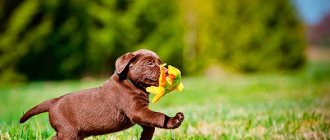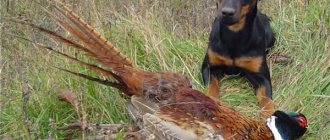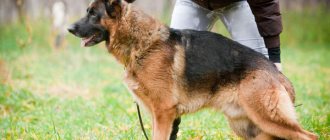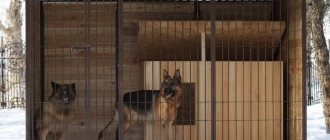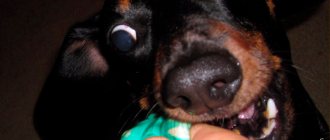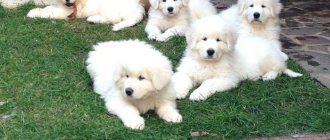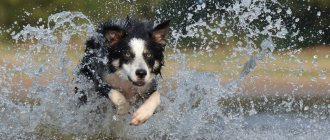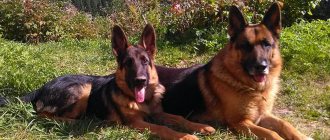Features of dog psychology
All dogs are pack animals, oriented toward their owner. They socialize well and try to please people in everything. They have a simple psyche, incapable of complex thought processes. However, they are good at grasping the cause-and-effect relationship, which is the basis of any training and education. It is believed that they cannot take revenge, but they have sufficient memory to remember the attitude towards them. Excessive cruelty and aggressiveness of people leads to mental deformation, fearfulness and unstable behavior appear.
Attitudes towards punishment differ among different breeds. For example, toy terriers and Italian greyhounds only need one disapproving glance from their owner. Temperamental dogs (Asian breeds, terriers and schnauzers), as well as all hunters, require more intense exposure.
A distinctive feature of Caucasian and Central Asian shepherd dogs (Alabaev)
In puppies of heavy breeds, the reaction to a command may be slightly inhibited - this is due to the longer definition of the puppy with the concept of leader and owner.
This does not mean that an Alabai or Caucasian Shepherd puppy is dumber than the generally accepted leaders in training (German Shepherd and VEO puppies). This means that the psyche of these dogs is at a more stable level and a little more pressure and a lot more patience are needed for the dog to “work in the desired mode.”
Caucasian and Central Asian Shepherd Dogs are born warriors and fighters with a high level of intelligence, quite capable of living without human intervention. They do not need an owner a priori!
Your task is to instill in the puppy the need to have a leader (in your person) and achieve strict obedience to your orders.
When to punish
The main principle of punishing a dog is that the reaction to its actions should be immediate. It should be taken into account that the pet does not have a logical connection. If you start scolding him for his actions after some time, the animal will not be able to connect these two events. Negative reinforcement should follow immediately after the misbehavior.
For example, if you come home and find torn things and a mess, then punishing your pet will be ineffective. He will not be able to connect these two events, and as a result, the owner’s appearance will be associated with unpleasant emotions for her.
How to behave correctly after punishment
After the punishment has been completed, you must remain in place, the dog must leave!
This is an immutable rule for you! It is not you who leaves the battlefield, but the one who is weaker and who must obey you.
Another mistake, when a shepherd puppy was punished, nullifies the entire previous process of education - caressing the sucker. After the “thrashing” received, the puppy begins to intensively seek your attention: it squats, crawls, squeals, twirls its tail, and tries to timidly kiss your hands or feet. The melted heart just begs for the baby to be immediately pressed to the chest.
Do not do that! According to the dog, you realized how wrong you were towards the puppy and “licked” the punishment, which means you can continue to indulge.
Moreover, the dog will clearly understand that in front of a stronger opponent, it is enough to kiss him and the enemy will “forgive” him. She will do the same thing when you are in real danger - she will rush to lick the one she will have to tear, protecting you and your family. Or he will avoid the conflict altogether. To avoid this error you must:
- stop the sucking effect with a strict: “Ugh!” and send the baby to his place;
- after some time, call the naughty boy in an even voice and let him enjoy your attention during the game or just let him lie down next to you.
Don't unleash your entire vocabulary on your dog! For her, this is a Chinese letter.
The smartest of dogs, over the course of 7-10 years of life in one family, learns to understand about 50-70 human phrases, and a small dog cub generally does not grasp the meaning between his offense and your length of fiery speech, which mentions conscience, calls to reconsider one’s behavior and lamentations for about his action.
Punishment is part of coercion, which means that the command to change an action should be given abruptly, briefly, with notes of pressure or threat.
How to punish for disobedience
There are several methods of punishment in cynology. Basic forms of negative reinforcement:
- Rebuke. One of the most popular methods. Draw the dog's attention to some action. A serious tone is enough for this, but you cannot shout.
- Unexpected actions. They allow you to distract your pet in order to correct behavior and reprimand. This could be a splash of water, a clap of your hands, the sound of a whistle, or a sharp tug on the leash.
- Ignoring. This method should be used only in extreme situations. Ignore the dog until he feels guilty about his behavior. If there are several people in the family, everyone should adhere to the same tactics.
- Shaking by the scruff of the neck. This method should only be used in exceptional cases. This action imitates the behavior of the mother when raising offspring.
To demonstrate your reaction to your dog's obedience on the street, you can jerk the leash sharply. Combines with the classic “fu” command to work with your pet during outdoor walks.
After punishment, you need to limit communication, games and praise. The dog needs to demonstrate your reaction to the behavior so that it quickly learns the necessary behavior model. After the pet has demonstrated that it has understood the lesson, be sure to make peace with it.
How to punish for biting or aggression
Aggressive behavior of a pet is unacceptable - bites from dogs of even small breeds can lead to serious injuries. Due to the structure of the jaws, they easily tear skin and muscles, and the force of teeth clenching is enough to break a human bone. Increased aggressiveness of dogs does not manifest itself sharply; as a rule, this is a consequence of improper maintenance and upbringing, regular physical violence from the owner. The following types of aggression should be distinguished:
- sexual;
- defensive and defensive;
- hierarchical;
- hunting;
- gaming;
- interspecific;
- maternal.
In addition, the dog may begin to bite due to exposure to sharp external stimuli. If she bites the owner or one of the family members, the reaction in the form of punishment should be immediate. You need to immediately take the pet by the collar and give a severe reprimand. Wait for a stable state, and in order to switch attention, you can do some unexpected action.
After the first demonstration of aggression towards people, it is recommended to go to OKD courses, as well as adjust the education process so that the pet understands the hierarchy. If there have been attempts to attack other animals on the street, walks should only be carried out with a muzzle. Biting and growling should not be punished physically, which can make the situation worse. After the dog has accepted the punishment and goes to reconciliation, it is imperative to show a good attitude towards it.
Basic Rules
Consistency on the part of all family members is necessary in the application of punishment.
Simply put, if the head of the family is trying to wean a four-legged household member from begging, children should not ignore this rule and feed the puppy from the table while adults are not looking. With such an approach to education, the animal will not understand what is wrong with asking for a tasty piece from the master’s table. Special treats in the form of treats have been created for dogs.
It is strictly forbidden to carry out punishment actions in the chosen place for the dog or after calling it with the command “Come to me”.
Again, the baby will become afraid to approach and this basic command, which the dog is taught almost from infancy, will cease to fulfill its function.
It is not recommended to scold the puppy and poke his face into a puddle made at home.
The psyche of animals is different from human. Therefore, the dog not only succumbs to humiliation by the owner who carries out such a “punitive” effect, but also believes that it is necessary to go exactly where the original puddle was made. Then it is too difficult to wean the animal from the “house toilet”; it is better to take it for a walk more often.
If she shits at home
A dog can relieve itself in an apartment if it is not trained to do this outside or has diseases of the excretory system. If a puddle or heap is found in the apartment, the pet should be immediately reprimanded. To do this, it is enough to slightly increase the tone of your voice, but do not shout. It is strictly forbidden to punish with food or beat an animal. If you see that the dog wants to relieve itself, you need to distract it from this with the “fu” command. Go outside with her as soon as possible (if all vaccinations have been completed). Useful recommendations if your pet does not want to pee on the street:
- find a friend for walks together - he can become an example;
- take water with you and give the dog something to drink after it runs;
- increase walking time;
- increase physical activity, play with your pet.
On average, the process of learning to relieve yourself on the street takes 1-2 months. Depends on the characteristics of training, age and health.
Photo: pixabay.com
We train a shepherd
Let's figure out how to train a puppy to achieve obedience. When training your dog, do not forget about the reward that should follow immediately after the command is completed. The dog should be trained first at home, in silence, then on the street and in the training area. Each command must be accompanied by a characteristic gesture. First comes the command, then the push to action (pressing the croup, etc.), but not vice versa.
Finish the training with the command that the baby performs best. You need to train a German Shepherd puppy patiently, without forcing events. You can’t scold a small dog if he hesitates or gets confused - he’s just a child, everything will come later.
Similar article: Features of keeping a German Shepherd in an apartment
Training should not take long, 10-15 minutes, but several times during the day. It is recommended to practice several commands in one approach. German Shepherd training should not be carried out in a bad mood - this will negatively affect the results.
Punishment for disobedience on the street
An ill-mannered dog can show aggression towards other animals on the street, run up to people, and also pick up trash. This can be dangerous, as your pet can easily eat a poisoned product or other people's excrement, which can lead to long-term treatment. Disobedience during a walk should be punished. Basic methods:
- pulling the leash;
- command "fu";
- severe reprimand.
If your pet exhibits aggressive behavior towards others, you should always wear a leash. When you see another animal, you need to bring your dog to your leg or sit next to it. For prevention, it is recommended to enroll in general training courses. To reinforce desired behavior, it is helpful to always carry a reward treat with you. For ease of control, before starting walks on the street, it is worth teaching the dog at home the simple commands “lie down”, “sit”, “stand”.
Photo: pixabay.com
How to punish for damaging things
The main reasons why a dog chews and spoils things in the house is puppyhood (teeth cutting), as well as insufficient physical activity. If you find chaos when you enter the apartment, the dog should not be beaten or punished with food. You should pay attention to what is happening and give a severe reprimand.
To avoid destructive behavior in your pet, you need to achieve physical fatigue. Outdoor games, endurance activities and long walks are suitable for this. It is recommended that adult dogs and puppies leave a bone or any other dense treat, which is also useful for cleaning their teeth.
How to punish a puppy
Is it possible to punish a dog? This is one of the first questions that arises at the beginning of training. Not only the characteristics of the dog’s subsequent behavior, but also its health depend on upbringing. The puppy's punishment should be very gentle. If he disobeys, it is enough to turn attention to yourself, and then give a stern reprimand or lightly shake him by the scruff of the neck.
A puppy can go to the toilet in an apartment for up to 4-6 months and chew things due to the active growth of teeth. In such situations, you cannot show physical and verbal aggression, deprive them of food, or drive them out into the cold. Young dogs have an active psyche, they learn quickly - from 3-4 months they can be taught the command “fu”, “near” and other necessary methods of control.
How not to punish a dog
When raising and training, there are a number of points that should not be allowed during punishment. This can cause changes in the psyche, resentment and loss of authority, and deterioration in socialization. Basic things you should not do:
- to cause a pain;
- hit with a hand or a sharp, heavy object;
- use collars with spikes, shock and other aggressive methods;
- take away toys and a lounger;
- intimidate;
- limit communication for a long period of time;
- use strong medications and surgery.
If you can’t establish a relationship with your dog or teach it basic commands, it is recommended to contact a professional dog trainer. Different dogs may have different behavioral reactions to punishment and reward, so it is important to take into account the temperament and character of your pet.
Characteristics and development of the psyche
A well-trained German Shepherd combines intelligence and a balanced character. She always tries to be close to her owner and is ready to protect him until her last breath. He will be an excellent watchman in a private home.
It is important that the upbringing and training of a shepherd dog takes place in accordance with its pace of development. There are different opinions regarding at what age you can adopt and start raising a German Shepherd. Some call it 1 month, but this is harmful to the dog’s mental development: from 4 to 7 months, he is socialized by imitating his mother, playing in the company of other puppies, etc. At this time, interaction with different people is important, otherwise a stranger will cause The dog is afraid or aggressive.
It is best to pick up a puppy at 8 months. At this time, he willingly makes contact and begins to become attached to one person. It is at this age that “Germans” demonstrate a high level of learning ability. However, now the puppy is very vulnerable; he is still unfamiliar with someone else’s home. You need to expose him to stressful situations less often, show care and affection. At about 3 months, the “transition period” begins: the dog tries to lead, becomes aggressive, and may begin to bite. This is the most important period in the formation of the dog’s character: he must understand that the owner, as well as all household members, have power over him.
At 6 months, dogs begin to “rebel” even in cases in which they obeyed before. In bitches this period ends at 7–8 months. In males, a new period of aggression may begin after the first mating. At the same time, from 6 to 11 months, the dog periodically experiences increased anxiety and attacks of fear. Depending on the skills of the trainer and the characteristics of the dog, it will take from 1 to 4 years to develop character.
Similar article: How long do German Shepherds live at home?
Briefly about the main thing
- Punishment, or negative reinforcement, is an important part of education and training.
- The reaction to aggression, damaged things and disobedience must be immediate.
- The main methods of punishment: severe reprimand, ignoring, shaking the withers.
- Even if a dog exhibits destructive behavior, it should not be beaten, starved, or deprived of companionship for a long time.
- Due to their developmental characteristics, puppies can relieve themselves in the house and chew on objects. With the right approach, this behavior goes away by 4-6 months.
Punishment is one of the most difficult aspects of raising a dog. Share your proven methods in the comments.
How to raise a puppy
Raising a German Shepherd puppy starts from day one. The puppy must learn that some things (biting, chewing on things, jumping on the owner) are unacceptable. It is important to do this right away, since it will be very difficult to wean the dog from inappropriate behavior later. It is better to simply distract a baby who has recently entered the house with other activities. An older puppy will have to be punished.
An important question: how to wean a puppy from relieving itself at home? First you need to teach him to go to the litter box, taking him there when he starts to sit down, and rewarding him for success. When you can take him outside, actively praise him for relieving himself there and scold him if he shits himself at home.
Socialization continues - a stranger should not cause unreasonable aggression. When a difficult period begins, it is important to train the dog to be completely obedient. She must give toys and food upon request, not snap, and not ignore commands. If you are not sure that the dog will obey on the street, it is better not to let him off the leash. Attempts to bite must be stopped abruptly, otherwise you will not end up with problems with an adult dog.
It is important to regularly train your pet, maintain a balance of rewards and punishments, behave confidently and calmly, without yelling or beating, even if he starts to bite.
When a male dog begins puberty, you cannot scold him for trying to imitate mating with foreign objects; it is better to distract him, otherwise the dog’s sexual instinct may fade away. This is especially undesirable for dogs intended for breeding. During a period when a stranger or an unfamiliar object causes fear, you need to get as close as possible, show that there is no danger, and allow the dog to sniff the “threat”. If training your German Shepherd is difficult, especially if it bites frequently, you should contact a dog trainer as soon as possible.
Similar article: Description and characteristics of the German Shepherd breed

